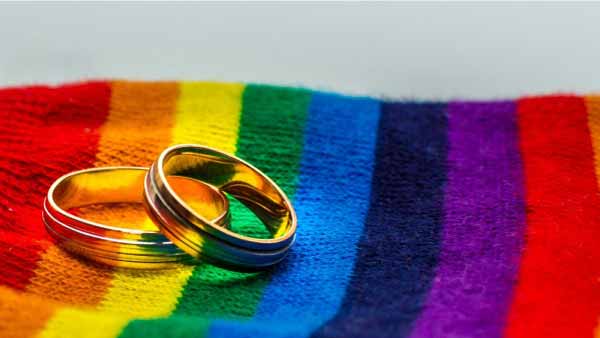Same-sex marriage, is a legal and formal union between two people of the same sex who commit to sharing their lives and responsibilities. In some countries, this form of marriage is legalized and legally recognized, while in others it is not.
Same-sex marriage has been the subject of controversy and debate around the world, with arguments for and against. The arguments in favour of same-sex marriage are based on the right to equality and non-discrimination of people based on their sexual orientation, as well as on the recognition of homosexual unions as a valid form of love and commitment.
Arguments against same-sex marriage are often based on religious beliefs, cultural traditions, and the idea that marriage is a sacred institution that can only be between a man and a woman. However, many countries have overcome these barriers and legalized same-sex marriage, recognizing that all people have the right to marry the person they love, regardless of their sexual orientation.
Human rights in same-sex marriage
Same-sex marriage is an issue that has generated much controversy regarding the protection of human rights. However, many international human rights bodies have recognized the right to equal marriage as a fundamental human right.
The Universal Declaration of Human Rights states that all human beings have the right to marry and found a family without discrimination. In addition, the International Covenant on Civil and Political Rights and the International Covenant on Economic, Social and Cultural Rights recognize that everyone has the right to form a family and that this family may be composed of persons of the same sex.
Therefore, denying the right to equal marriage to same-sex couples is considered a violation of human rights, since it implies discrimination based on sexual orientation and denial of the right to marry and start a family.
In addition, marriage equality also gives same-sex couples the same legal rights and protections that are afforded to heterosexual couples, such as property rights, right to inheritance, right to social security, and right to health care.
The recognition of same-sex marriage as a fundamental human right is important to ensure equality before the law and non-discrimination on the basis of sexual orientation, and to provide same-sex couples with the same legal rights and protections afforded to heterosexual couples.
Legal recognition
Legal recognition of same-sex marriage varies around the world. In some countries, same-sex marriage is fully legalized and they are given the same legal rights and responsibilities as heterosexual couples. In other countries, same-sex marriage is not legalized, but other forms of civil or de facto unions, such as civil unions or domestic partnerships, are recognized, which may provide some legal rights and protections similar to marriage.
Legal recognition of same-sex marriage is important because it gives same-sex couples the same legal protection afforded to heterosexual couples, such as the right to inherit, receive social security benefits, make medical decisions, and adopt children. In addition, it is also important in terms of equality and non-discrimination, since denying the right to marriage to same-sex couples implies discrimination based on sexual orientation.
In many countries, legal recognition of same-sex marriage has been the result of a struggle for human rights and equality, and has been driven by pressure from activist groups and civil society. As acceptance and understanding of sexual and gender diversity continues to grow around the world, more countries may legalize same-sex marriage and ensure equality before the law for all their citizens, regardless of their sexual orientation.
Affectation in the family
Legal recognition of same-sex marriage does not adversely affect families, but recognizes and protects all families, regardless of their composition. Same-sex families already exist and deserve the same legal rights and protections as heteroparental families.
The legalization of same-sex marriage does not imply the elimination or weakening of marriage between people of different sexes. Instead, it simply extends the right to marry to all couples, regardless of their sexual orientation. This means that heteroparental families will continue to exist and maintain their legal rights and protections.
Legal recognition of same-sex marriage also has benefits for same-sex families, as it allows them to obtain the same legal rights and protections as heteroparental families. This may include adoption rights, social security rights, right to health care, and inheritance rights, among others.
The legal recognition of same-sex marriage does not adversely affect families, but recognizes and protects all families, regardless of their composition. This is important to ensure equality before the law and to provide all families with equal legal rights and protections.
Religious and moral values about Same-sex marriage
The issue of same-sex marriage is often the subject of debate in relation to religious and moral values. Opinions about same-sex marriage vary across different religions and cultures, and some people may believe that marriage should only be between a man and a woman because of their religious and moral beliefs.
It is important to note that legal recognition of same-sex marriage does not imply that religious individuals or institutions must marry same-sex couples against their beliefs. Civil marriage is a legal matter, and religious institutions have the right to decide who they will marry based on their religious beliefs.
However, it is important to note that civil marriage is a legal matter and that equality before the law and non-discrimination on the basis of sexual orientation are fundamental human rights values. Some religious and moral values may not agree with same sex marriage, but that doesn’t mean same sex couples should be denied legal rights and protections.
Ultimately, the opinion on same sex marriage is a personal matter and depends on the values and beliefs of each individual. However, it is important that human rights are protected and that all people have equality before the law and are protected against discrimination, regardless of their sexual orientation.
Social concerns about Same-sex marriage
The legal recognition of same sex marriage has been the subject of social concerns on the part of some sectors of society. Some people may feel that same sex marriage goes against traditional norms and cultural values, and may fear that this will have a negative impact on society.
However, most of these concerns are not supported by evidence and are not based on facts. Research has shown that legal recognition of same sex marriage does not have a negative impact on society, but can have social and economic benefits.
For example, legal recognition of same sex marriage can strengthen the stability and commitment of couples, which can have a positive impact on individuals’ mental and physical health and family stability. It can also increase equality and non-discrimination, which can improve social cohesion and peaceful coexistence.
In economic terms, same sex marriage can have benefits by increasing demand for goods and services and generating tax revenue. It can also help attract talent and human capital to the country and improve the international image.
Although there may be societal concerns about same sex marriage, evidence suggests that legal recognition of same sex marriage does not have a negative impact on society, but can have social and economic benefits. Legal recognition of same sex marriage is important to ensure equality before the law and non-discrimination, and to protect the human rights of all people, regardless of sexual orientation.


